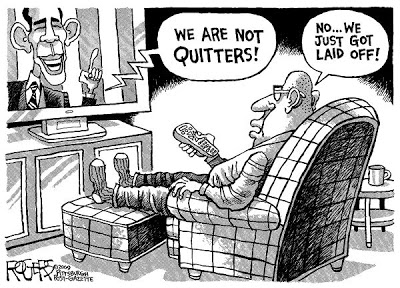Believe it or not, quitting isn’t necessarily the mark of a loser. There is a time and place for giving up. Just as there is a time and place for digging your heels in, gritting your teeth, and staying on.
Does that mean then that Napoleon Hill’s saying “a quitter never wins and a winner never quits” is moot?
The answer as you’d probably guess is that it depends.
According to a podcast by Stephen J. Dubner on Freakonomics.com, there are upsides to quitting — if you do it for the right reasons.
Other than the often cited career changing quits, you may also choose to quit a relationship, a lifestyle, a band, a bad habit, a sports team, a community or even a religion.
In evaluating the dilemma between staying or going, a common consideration is the balance between sunk costs and opportunity costs. This a trade-off between what you have spent (time, money, energy) in any endeavour, and what you will forego if you do choose to continue in that trajectory.
Often, people end up sticking to what they’re doing because of the blood, sweat and tears that they’ve already invested in any activity. Indeed, Dubner shared that humans are psychologically wired to avoid waste, and quitting would seem counter-intuitive.
However, failing to recognise that you are on the wrong path may sometimes be an emotionally and psychologically damaging exercise down the road. Imagine if you recognise many years later that you have wasted the best years of your life flogging the wrong horse.
By then, it may be too late to unravel the years of your lost youth and opportunity.
This problem is further compounded by the issue of knowing when to quit.
According to Seth Godin’s book “The Dip”, you shouldn’t simply bail out at the lowest point of your career/relationship/project/whatever if pushing it for that much longer will yield the results that one desire.
In other words, don’t quit when you’re feeling down, crappy, or embattled.
Instead, quit when you’re clear that you’re running the wrong race, headed to a destination that is uncertain to bring forth personal fulfillment.
Of course, the question is further worsened by the difficulty in measuring success and failure.
Does rising to the top of the organisational food chain constitute self actualisation? Is material achievement the only yardstick?
On the flipside, is success measured only by your own happiness as opposed to your influence on the lives of others?
In the arena of your mind, played between your dreams, goals and ideals, you ought to also consider the harsh realities of life.
Repeated quitting may give you a temporary psychological boost, but does nothing for your financial situation.
And we all know that inflation isn’t going to go away anytime soon — even in an uncertain economy.
As we consider once again this age-old question, let me leave you with a song that perhaps best characterize the issue of whether you should stay or you should go:

